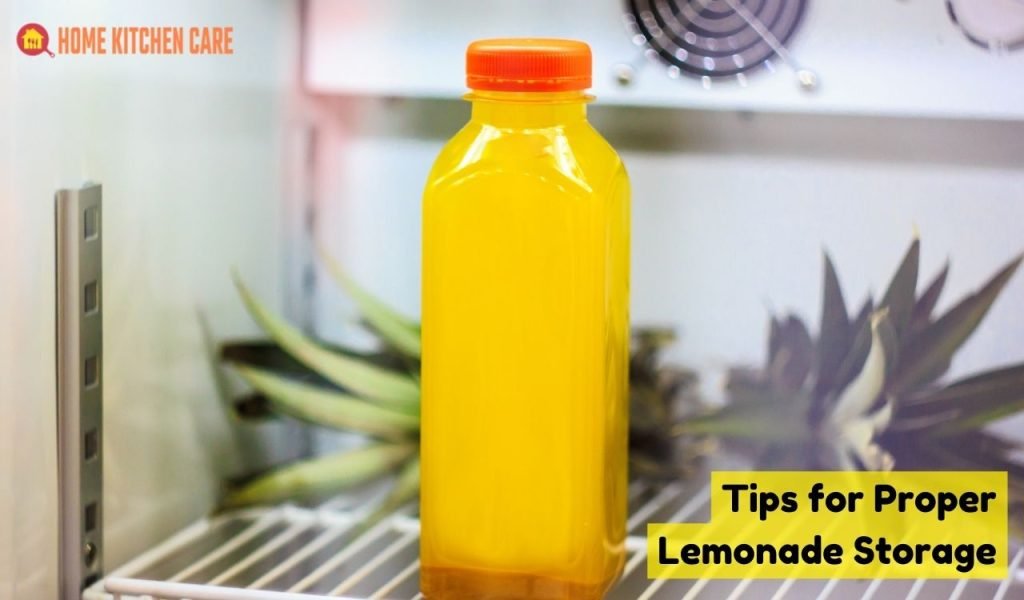Physical Address
304 North Cardinal St.
Dorchester Center, MA 02124
Physical Address
304 North Cardinal St.
Dorchester Center, MA 02124

Does lemonade need to be refrigerated? The answer might surprise you. Whether you’re a lemonade enthusiast or just looking to quench your thirst, the way you store this classic beverage can impact its taste and safety. In this quick guide, we’ll unravel the mysteries of lemonade storage.
From the fridge to alternative methods, we’ve got you covered. So, before you take that refreshing sip, let’s dive into the world of lemonade storage and ensure your next glass is nothing short of perfection.
Main Summary: Does Lemonade Need to Be Refrigerated?
Lemonade benefits from refrigeration to maintain freshness and safety. While not an absolute requirement, chilling it enhances taste and prevents bacterial growth due to its high sugar content. Storing it in the fridge is recommended for a better lemonade experience.
Before we jump into What is a Refrigerator debate, let’s talk about the shelf life of lemonade. Lemonade is a delightful mix of lemon juice, water, and sweeteners. Homemade or store-bought, its shelf life can vary depending on several factors.
The composition of your lemonade plays a crucial role in determining how long it stays fresh. If you’ve whipped up a batch of homemade lemonade, it’s important to consider the ingredients. Freshly squeezed lemon juice, for instance, contains natural citric acid, which acts as a preservative.
Sugar, too, can extend the shelf life by inhibiting bacterial growth. On the other hand, store-bought lemonades may contain additives and preservatives, further prolonging freshness.
Now, let’s address the big question: refrigeration. Does lemonade need to be stored in the fridge? Well, the short answer is, it depends. The temperature at which you store your lemonade can significantly impact its shelf life.
If you plan to consume your lemonade within a day or two and your home temperature isn’t scorching, leaving it at room temperature is generally acceptable. The acidity of lemon juice helps inhibit the growth of harmful bacteria. Just ensure it’s covered and kept in a cool, shaded spot.
Refrigeration is your best friend for long-term lemonade storage. Cold temperatures slow down the degradation of flavors and help maintain the beverage’s freshness. It’s particularly crucial if you’ve added perishable ingredients like fresh fruit slices.

Now that we’ve established the basics, let’s delve deeper into the factors that affect whether your lemonade needs refrigeration or not.
So, should you refrigerate your lemonade? The key is to strike a balance between freshness and convenience. Here are some practical tips to help you make the right choice:
So, does lemonade need to be refrigerated? It ultimately depends on various factors, including the ingredients, ambient temperature, and your intended consumption time. In hot weather or if your lemonade contains perishable components, refrigeration is your safest bet. However, for a quick, refreshing glass of lemonade on a pleasant day, leaving it at room temperature for a short while is perfectly fine.
Remember, the goal is to enjoy your lemonade while keeping it safe and tasty. With these insights, you can savor every sip of your homemade or store-bought lemonade, perfectly chilled or comfortably at room temperature. Cheers to quenching your thirst with this timeless classic!
Enjoying a refreshing glass of lemonade is a delightful experience, but it’s essential to know when this beloved beverage has gone bad. Recognizing the signs of spoiled lemonade is crucial for your health and enjoyment. Here are key indicators to watch for:
Being vigilant about these signs will ensure that you enjoy your lemonade at its freshest and safest. When in doubt, it’s always better to err on the side of caution and dispose of any lemonade that exhibits these spoilage indicators.

Lemonade, with its refreshing citrusy flavor, is a beverage best enjoyed when it’s at its freshest. Proper storage is key to maintaining its taste and quality. Whether you make your own lemonade or purchase it, these tips will help ensure you get the most out of your lemonade:
By following these tips for proper lemonade storage, you can ensure that your favorite citrusy beverage stays fresh, flavorful, and safe to enjoy. Whether you’re sipping it on a scorching summer day or serving it at a gathering, the right storage practices will help you make the most of every glass of lemonade. Cheers to keeping your lemonade cool and delightful!
Refrigerating lemonade is a common practice to extend its freshness, but it’s essential to be aware of potential health risks associated with improper storage. Here are some concerns you should consider:
Storing lemonade in the refrigerator doesn’t guarantee its safety from mold growth. If the container or dispenser isn’t properly cleaned and dried before refilling, mold can develop and contaminate the lemonade.
In a crowded refrigerator, lemonade containers can come into contact with other foods or beverages. If those items are spoiled or contaminated, there’s a risk of cross-contamination.
Refrigerators are not immune to temperature fluctuations. If the temperature inside the fridge rises and falls frequently, it can affect the freshness and safety of stored lemonade.
While refrigeration can slow down the degradation of lemonade, it doesn’t stop it entirely. Over time, even refrigerated lemonade can spoil if left for an extended period.
The type of container used for storing lemonade in the fridge matters. If the container is not airtight or has been previously used for other purposes, it can compromise the lemonade’s quality.
Lemonade with added perishable ingredients, like fresh fruit slices, can be a breeding ground for bacteria if stored improperly. Refrigeration helps, but it’s not foolproof.
To minimize these health risks, follow these guidelines:
While refrigerating lemonade can help preserve its freshness, it’s not without risks. Proper storage, regular cleaning, and mindful consumption are essential to ensure your chilled lemonade remains both refreshing and safe to drink.

While refrigeration is a common and effective way to store lemonade, there are alternative methods you can explore, depending on your preferences and circumstances.
If you plan to consume your lemonade within a day or two, and the room temperature is moderate, you can leave it at room temperature. Lemon juice’s natural acidity helps inhibit bacterial growth, making it safe for short-term storage. Ensure the container is tightly sealed and placed in a cool, shaded area away from direct sunlight and heat sources.
Freezing lemonade is an excellent option if you want to extend its shelf life significantly. Here’s how you can do it:
If you’ve purchased canned or bottled lemonade, it often comes with a longer shelf life, thanks to the sealing and pasteurization process. These products can be stored at room temperature until opened. Once opened, refrigeration is necessary to maintain freshness, but you can follow the manufacturer’s guidelines for best practices.
Some commercial lemonade brands contain preservatives that allow them to be stored at room temperature even after opening. Be sure to check the label for information on storage requirements and follow those guidelines.
Remember that while these alternative methods can work, they may impact the taste and quality of your lemonade over time. It’s essential to consider the trade-offs and choose the storage method that aligns with your taste preferences and consumption patterns.
Whether or not lemonade needs to be refrigerated depends on a variety of factors, including its ingredients, ambient temperature, and intended consumption timeframe. Refrigeration is a safe bet for long-term storage, especially if your lemonade contains perishable components.
However, if you plan to enjoy it promptly and the conditions are favorable, leaving it at room temperature for a brief period is acceptable. The key is to strike a balance between freshness and convenience, ensuring that every glass of lemonade you enjoy is both safe and delicious.
Leaving lemonade unrefrigerated for extended periods can lead to spoilage, affecting taste and safety. It’s best to refrigerate it to maintain freshness and avoid potential health risks.
Yes, it’s advisable to refrigerate lemonade after opening. This helps prevent bacterial growth and maintain the quality of the beverage. Refrigeration is essential for preserving the taste and safety of lemonade.
Lemonade should be refrigerated if you plan to store it for more than a few hours. For optimal taste and safety, refrigeration is recommended. It ensures that the lemonade remains refreshing and free from potential contaminants.
Yes, Simply Lemonade can go bad if left unrefrigerated for an extended time. This applies to most commercially prepared lemonades as well. Refrigeration is crucial for preserving its freshness and preventing spoilage.
Refrigeration offers several benefits when it comes to storing lemonade. It slows down the degradation of flavors, maintains freshness, inhibits bacterial growth, and ensures the beverage remains safe to consume. Refrigerating lemonade is a key factor in preserving its quality.
Lemonade should be refrigerated if you don’t plan to consume it within a few hours. Prompt refrigeration is essential for preventing spoilage and maintaining the beverage’s taste and safety. Always refrigerate leftover lemonade.
Lemonade can last a few hours at room temperature. However, beyond that timeframe, it’s best to refrigerate it to ensure its safety and taste. Leaving lemonade out of the fridge for too long can lead to spoilage and bacterial growth.
Leaving lemonade unrefrigerated can result in several issues. It may lead to spoilage, causing the lemonade to develop off flavors and potentially become unsafe to consume. Bacterial growth can occur, posing health risks. Refrigeration is crucial for preserving the quality and safety of lemonade.